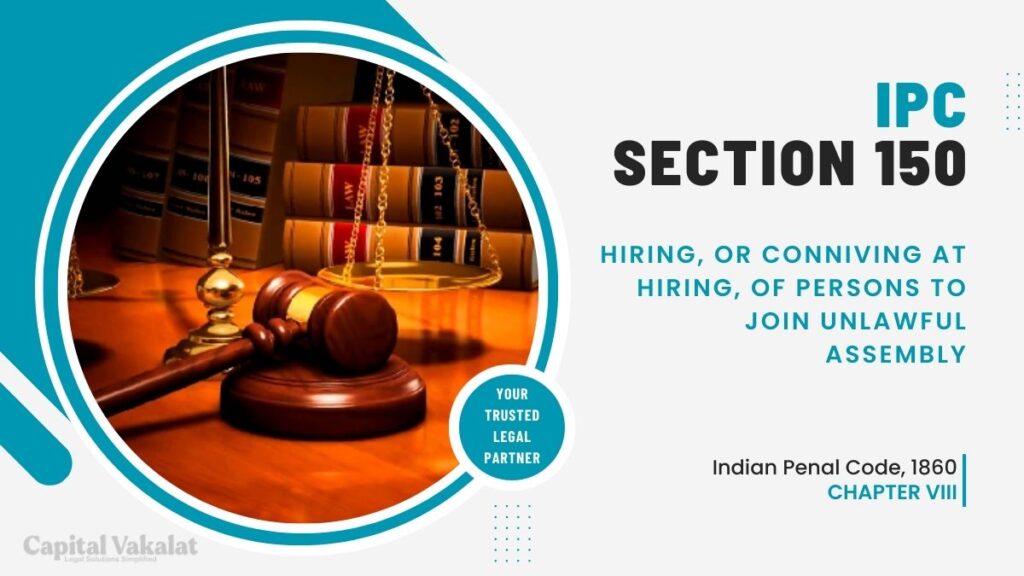In this article, we will explore the legal intricacies surrounding “Section 150 IPC: Hiring, or conniving at hiring, of persons to join an unlawful assembly.” Section 150 of the Indian Penal Code is an important legal provision that deals with the act of hiring or conniving at hiring individuals to join an unlawful assembly.

This article aims to provide a comprehensive understanding of this law, its implications, and the challenges associated with its implementation.
Understanding Section 150 IPC
Section 150 of the Indian Penal Code (IPC) addresses the act of hiring or conniving at hiring individuals to join an unlawful assembly. An unlawful assembly is a gathering of five or more persons with the common objective of committing an unlawful act. This section seeks to curb the recruitment and instigation of individuals to participate in such assemblies, which often lead to public disorder, violence, and disturbances.
The Legal Perspective
From a legal standpoint, Section 150 IPC plays a crucial role in maintaining law and order in society. It serves as a deterrent against those who attempt to exploit others for illegal purposes. The law holds not only those who actively participate in unlawful assemblies accountable but also those who facilitate such assemblies through hiring or conniving.
Hiring for Unlawful Assembly: A Deep Dive
When it comes to hiring individuals for an unlawful assembly, the focus is on the act of recruitment. This could involve offering monetary incentives, using coercion, or any other means to persuade people to join an unlawful assembly. Such actions are considered a grave offense under Section 150 IPC.
The Role of Conniving
The term “conniving” implies willful involvement or collaboration in the formation of an unlawful assembly. Individuals who knowingly aid and abet in the assembly’s creation can be prosecuted under this section. This includes not just those directly involved but also those who provide logistical support or resources.
Unlawful Assembly and Its Consequences
Unlawful assemblies often result in chaos, violence, and public disturbances. To maintain law and order, it is essential to hold not only the participants but also the instigators accountable. Section 150 IPC helps in ensuring that those who orchestrate such assemblies face legal consequences.
Historical Context
This section of the IPC has its roots in the colonial era when the British rulers needed a legal framework to control gatherings and prevent uprisings. It was retained after independence, emphasizing the importance of curbing unlawful assemblies for the stability of the nation.
Notable Legal Cases
Over the years, several legal cases have brought Section 150 IPC into the spotlight. Notable cases have highlighted the complexities and challenges in proving the hiring or conniving at hiring of individuals for unlawful assemblies. These cases have also raised questions about the burden of proof and the need for concrete evidence.
The Burden of Proof
To secure a conviction under Section 150 IPC, the burden of proof lies with the prosecution. They must establish that the accused either hired or connived at hiring persons for an unlawful assembly. This can be challenging due to the clandestine nature of such activities.
Challenges in Prosecution
Prosecuting individuals under Section 150 IPC can be difficult due to the secretive and covert nature of hiring for unlawful assemblies. Lack of direct evidence and the involvement of multiple parties often make it challenging to build a strong case.
Punishments and Sentencing
The punishment for violating Section 150 IPC can be severe, including imprisonment. The severity of the punishment depends on the specific circumstances and the degree of involvement of the accused.
The Need for Stringent Laws
The existence of Section 150 IPC highlights the need for stringent laws to deter individuals from engaging in unlawful activities. By targeting not only those who participate but also those who facilitate unlawful assemblies, it sends a strong message against such actions.
Public Opinion and Critiques
The implementation of Section 150 IPC has been a subject of debate. While some argue that it is necessary to maintain law and order, others raise concerns about potential misuse and the need for safeguards to protect individual rights.
Recent Developments
In recent times, efforts have been made to revisit and amend Section 150 IPC to address contemporary challenges. This includes ensuring that it is not misused and that the rights of individuals are safeguarded.
Conclusion
In conclusion, Section 150 IPC plays a vital role in deterring the hiring and conniving at hiring of individuals for unlawful assemblies. It is a legal provision that seeks to maintain law and order in society. While it has its importance, the challenges in prosecution and concerns about misuse underline the need for a balanced approach to its implementation.
Frequently Asked Questions
What constitutes hiring under Section 150 IPC?
Hiring, as per this section, refers to the act of recruiting or persuading individuals to join an unlawful assembly, often involving financial incentives or coercion.
What are the consequences of violating Section 150 IPC?
Violation of Section 150 IPC can lead to severe punishments, including imprisonment, depending on the degree of involvement of the accused.
Why is the burden of proof significant in cases under Section 150 IPC?
The burden of proof lies with the prosecution to establish that the accused either hired or connived at hiring persons for an unlawful assembly. This is crucial in securing a conviction.
What are the recent developments regarding Section 150 IPC?
Recent efforts have been made to revisit and amend the section to address concerns about potential misuse and safeguarding individual rights.